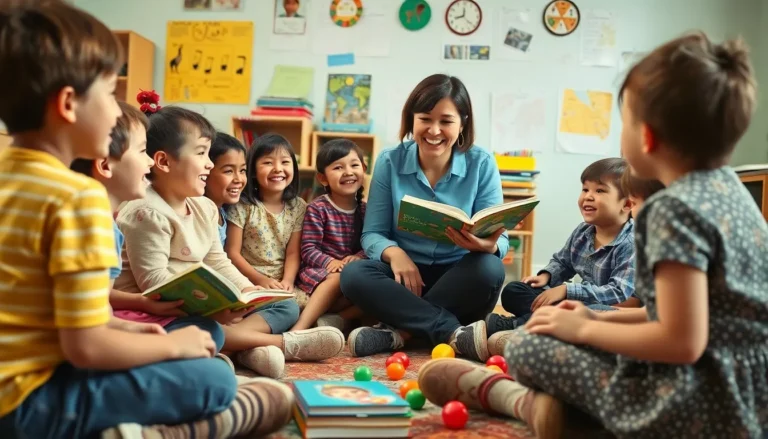Table of Contents
ToggleParenting can feel like a high-stakes circus act, juggling tantrums, homework, and the occasional flying sippy cup. But what if there was a way to turn that chaotic three-ring show into a serene stroll through the park? Stress-free parenting isn’t just a dream; it’s a reachable goal that can make life with kids a whole lot easier and a lot more fun.
Imagine swapping out the frazzled hair and racing heart for laughter-filled moments and peaceful evenings. With the right strategies, parents can trade in their stress for joy, ensuring that family time is cherished rather than dreaded. It’s time to embrace the chaos with a smile and discover how to navigate the wild world of parenting without losing your sanity—or your sense of humor.
Understanding Stress-Free Parenting
Stress-free parenting embodies a balanced approach that cultivates joy and fulfillment in family life. Embracing this mindset transforms chaotic moments into opportunities for connection and growth.
Benefits of Stress-Free Parenting
Adopting stress-free parenting enhances emotional well-being for both parents and children. Children thrive in a calm environment, leading to improved behavior and better communication skills. Parents experience reduced anxiety, which fosters a more positive atmosphere. Stronger family bonds form as parents engage in quality time without the burden of stress. Increased patience and understanding develop, enabling parents to navigate challenges more effectively. Ultimately, this approach creates lasting memories and a sense of fulfillment.
Common Misconceptions
Many believe stress-free parenting equates to a lack of discipline. Effective parenting does not ignore boundaries or rules. Instead, fostering a peaceful environment reinforces structure while promoting emotional resilience. Some think achieving a stress-free state requires unrealistic perfection. Realistically, balance comes from embracing imperfections and anticipating daily challenges. Another misguided belief is that stress-free parenting eliminates all conflict. Resolving disagreements remains essential, with constructive approaches minimizing tension. Understanding these misconceptions clarifies that stress-free parenting focuses on nurturing a supportive family dynamic.
Techniques for Achieving Stress-Free Parenting

Utilizing effective techniques fosters a stress-free parenting environment. These methods enhance interactions within the family, promoting a positive atmosphere.
Effective Communication Strategies
Establish open communication as a foundation for understanding. Listening actively ensures children’s voices are heard. Asking questions encourages dialogue and builds trust. Expressing feelings and thoughts clearly helps to diffuse tension. Using family meetings strengthens connections while addressing concerns collectively. Encouraging kids to share their experiences fosters emotional intelligence. Incorporate kindness and respect into conversations, which reinforces positive behavior.
Time Management Tips
Prioritizing tasks significantly reduces stress. Creating a daily schedule helps organize routines efficiently. Allocating specific time slots for activities keeps everyone focused. Involving children in planning teaches responsibility and time awareness. Setting realistic goals prevents feelings of being overwhelmed. Learning to say no preserves family time for meaningful activities. Establishing designated time for fun fosters stronger family bonds while balancing responsibilities.
Creating a Supportive Environment
Creating a supportive environment enhances a family’s overall well-being and fosters healthy relationships. Parents can implement specific strategies to cultivate this atmosphere.
Importance of Routine
Establishing a routine provides children with consistency and security. Predictable schedules help young ones understand expectations and create a sense of order. Daily activities, such as meals, homework, and bedtime, become rituals that promote stability. By integrating time for fun and relaxation into the routine, families balance responsibilities with leisure. Families that maintain routines experience fewer conflicts and reduced stress levels. Children thrive in environments where they know what to anticipate.
Encouraging Independence
Fostering independence builds confidence in children. Allowing kids to make choices empowers them and enhances decision-making skills. Assigning age-appropriate tasks, such as dressing themselves or helping with household chores, instills a sense of responsibility. Parents can guide this process by providing support without taking control. Encouragement to solve problems and explore outside of structured activities promotes growth. Autonomy nurtures resilience, allowing children to learn from mistakes. An environment rich in independence prepares kids for future challenges.
Balancing Parenting and Self-Care
Balancing parenting and self-care leads to a happier family dynamic. Focusing on both aspects ensures overall well-being.
Prioritizing Your Mental Health
Mental health plays a crucial role in effective parenting. Embracing practices like meditation or deep-breathing exercises can reduce stress. Scheduling personal time contributes significantly to emotional stability. Parents find that regular exercise not only boosts mood but also enhances energy levels. Seeking support from friends or professionals further strengthens mental resilience. By prioritizing mental health, parents model positive behaviors for their children.
Engaging in Family Activities
Engagement in family activities strengthens connections. Organizing weekly game nights brings joy and fosters teamwork among family members. Exploring local parks or nature trails encourages physical activity while creating lasting memories. Cooking together promotes cooperation and instills healthy eating habits in children. Volunteering as a family cultivates empathy and gratitude while reinforcing community bonds. Engaging in shared experiences enhances family well-being and creates a supportive environment.
Stress-free parenting isn’t just a dream; it’s a practical approach that can lead to a more joyful family life. By embracing the chaos with humor and positivity, parents can create lasting connections with their children.
Implementing effective strategies like open communication and establishing routines fosters a supportive environment. This not only enhances emotional well-being but also nurtures resilience in children.
Prioritizing self-care and family activities ensures that parents remain balanced and engaged. Ultimately, stress-free parenting empowers families to navigate challenges together while cherishing the beautiful moments that come with raising children.







